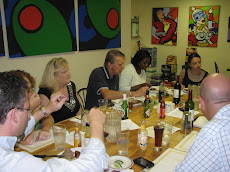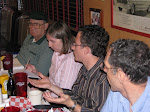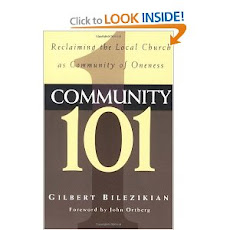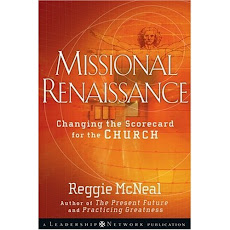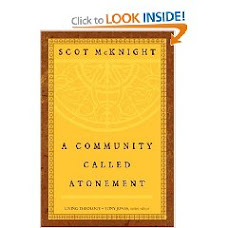 “It’s more important to make a difference than to argue about our differences.”
“It’s more important to make a difference than to argue about our differences.”Ten of us gathered for a time of conversation, community and Cuban food on May 12. We continued to discuss postmodernism. Michelle joined us as a newcomer and we went around and all shared a little about ourselves and our own spiritual journey. This turned out to be a great way to hear where each of us is at, individually, and as we have been coming to the table together.
We shared and heard many of the same themes, first about what people were coming away from: legalism, always studying but never arriving, facing so many hurdles we become tired, constraints like this music or art is acceptable and that isn’t. Then we shared and heard where we’re moving to: community, seeking the face of God, creativity and being culturally relevant, serving the homeless and needy, loving God and loving our neighbor. It was a good time of sharing which led us to Beth telling her story…
Beth’s Story
Beth was a “missionary kid” (MK). Her dad is a United Methodist pastor and growing up in Southeast Asia and Central America helped shape her worldview. Following the Biblical example, she recalls her father helping a homeless man with leprosy, and instilling the attitude, “maybe one could get leprosy this way, but it’s the right thing to do.” Church was positive and comfortable, with a focus on "right living" and outreach, but without rapture stories or “hellfire & brimstone” sermons. On the other hand, growing up as a missionary kid influenced who Beth became, giving her empathy for outsiders and a sense of why we’re here…to look out for others in Christ's name. She was able to express art, creativity and talent, and at age four aspired to be a “ballerina missionary.”
Growing up in Central America at the beginning of a period of civil war, knowing of people being jailed and persecuted throughout the Americas, and later--liberation theology and living in community houses all gave Beth a more mature concept of what Christianity is about. And that it is not simply a service on Sunday mornings.
Beth married Flavio (See Oct. 08 Meeting for Flavio’s story), who is from a Mennonite background, while in college. They lived for a while in San Antonio, TX near an area of government housing characterized by gang & drug violence and drive-by shootings. They joined a “peace circle” among the residents (all immigrants and refugees) and later began a community meeting where they met regularly, read the Bible, and experienced and talked about the ways God was intervening in their everyday lives. One result of the peace circle was that peace did indeed breakout and this violent block became known as a place where it was safe for kids to play and one where people tried to move to and not away from. Beth and Flavio lived among the poor, who had minimal access to healthcare, where it was a struggle to feed one’s family and people lived on the verge of homelessness. This also influenced how they themselves lived, in community, with people committed to living "missionally" and taking turns cooking, cleaning and taking out the trash and re-cycling. This incarnational living is a demonstration of God’s love by meeting the obvious needs of the people around us. And while not an overt evangelistic crusade, this living is infused by faith and only possible through a deep faith in Christ.
Beth shared about different styles with which churches approached ministry in the poor neighborhood. Some church congregations would come with loud speakers and tracts and try to get people to go to their church. They didn’t go. The people in the government housing project explained they didn't go to the church of the people with the tracts and loudspeakers because, “They’re only here on Sunday, and you’re here every day and know what it's like.” Beth also shared a story about working with laid-off garment workers who were locked out of the factory. They didn’t believe they had the right to raise their voice until they learned that God does hear the cry of the oppressed. And finally, she told a humorous and blessed story of holding communion in the housing project in San Antonio, with the (Matt. 10:11) woman of peace and her husband who had a tendency to imbibe too much. They sent him to the store to buy the wine for communion. He came back with a bottle of Thunderbird. So there they were, in beloved community, with no professional clergy… remembering Jesus…with tortillas, and a bottle of Thunderbird wine for their communion. These simply were, as Melissa put it, the elements we use in every day life.
After Beth and Flavio moved to Broward County they began encountering emerging Christians, such as at Epic Re-mix church. And they began to read books like Velvet Elvis and Surprised by Hope. All of this resonated with their own spiritual journey. Following Christ became less and less about how to get people into structured church organizations. It became more and more about gathering, being disciplined and learning from other Christians. At the same time they no longer felt called to a structured church congregation, they also felt there was a whole lot more to do. Life was to be missional, and flexible. It was to happen where we live and be expressed by how we relate to those around us. We’re here also to do this with other people and not be a lone ranger. Following Christ is not a trip about “my own personal Jesus.” It is a journey into community, with God and with others. Living in a poor neighborhood has been part of Beth & Flavio’s spiritual journey. It is counterintuitive in our culture.
Melissa observed that the way we relate to people can break down barriers that keep us separated from God and from each other. It doesn’t mean that we have all the right answers, but that we walk alongside one another on the journey.
One of Beth’s main take-aways from her life’s experience is that it is ok not to have all the answers, and to simply listen to what God has to say through others.
This led to a discussion about incarnational living and what that means. The Christian gospel has too often been reduced to well reasoned arguments, which Michelle equated with pride. Steve F. recalled his many years in the church which relied on well reasoned argument…about salvation, evolution, and what a Christian is supposed to be and look like and believe. Where it all falls down he said is when you’re faced with a real live person, including a son, a daughter, a wife, who doesn’t fit neatly inside the box. Michelle said that knowledge is good but it is not what is going to get us into the Kingdom of Heaven. It’s more important to make a difference than to argue about our differences. Kelly told a story about a time when he was at Piccadilly Circus in London and a street performer gathered a crowd by making fun of Christian caricatures. When he was done he turned the tables and told the crowd, “Now, I want to tell you about Jesus.” The reaction of the crowd was probably not what he expected…everyone kept laughing at him. We concluded that if we’re not relational, the gospel can too often become a circus.
We prayed for some of the needs among us before we parted. We decided to meet again on Tuesday evening, June 2, to continue the conversation.
That we may be one,
Steve
